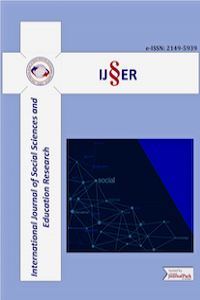Attitude of Afghan youths on watching foreign dubbed serials: A case study of Takhar University, Afghanistan
The leading intention of this study was to discover the attitude of Afghan youths on watching foreign dubbed serials. The data were collected from 80 students including male and female who were studying at Takhar University in various majors. The participants were chosen randomly. The research instrument was a semi-structured interview. The data were analyzed based on thematic analysis. The outcome of the research is indicative that 96% of youths watch foreign dubbed serials, but 90% of them think that watching foreign dubbed serials have negative impacts on Muslim youths. Their reason is that the foreign dubbed serials like Turkish, Indian, and Americans are full of matters such as kidnapping, divorce, living in pleasure, drinking wine, illegal love affairs, and family distrust that change the minds of youths and guide them to apply those matters in their daily lives which are against Islamic values. Also, the result of the study illustrated that 80% of the study participants believe that foreign dubbed serials are extremely broadcast in Afghanistan because Afghanistan is a colonial and dependent government. Therefore, it is forced to implement the commands and purpose of superpower countries by any medium.
Keywords:
Atittude, , Afghan Youth, , Dubbed Serials, Takhar University, ,
___
- Alradimi, M. A., & Al-Ali, F. A. (2019). Motives for watching dubbed TV shows by university students in the U.A.E. Global Media Journal, 17, (32), 171. Retrieved from https://www.globalmediajournal.com/open-access
- Alsaawi, A. (2014). A critical review of a qualitative interview. European Journal of Business and Social Sciences, 3 (4), PP.149-156 retrieved from https://papers.ssrn.com/
- Ann Morris, S. (1961). Family interaction is influenced by television for some time. Iowa: Jowa State University.
- Anwari, R. (2008, May 14). The cultural differences of Indian serials. Retrieved August 5, 2020, from https://www.bbc.com/persian/arts/story/2008/04/080423_k-ram-hindi-serials
- Asifi, H. (2012, June 6). Turkish serials affluent market and anger of religious clergies.Retrieved from https://www.darivoa.com/a/turkish-series-soap- opera/1596019.html
- Blinn, M. (2008). The dubbing standard: Its history and efficiency implications for film distributors in the German film market. Berlin: Freie University Berlin.
- Fars News. (2014, February, 8). Seventy percent of Turkish women wear hijab but the serials are against morality. Retrieved from https://www.khabaronline.ir/news/358999/70
- Fooladi, Y., Saljooqi, A., & Qazi Zadeh, P. (2107, March, 13). Turkish and Indian Serials broadcast are not related to freedom of speech. Retrieved August, 12, 2020, from https://www.avapress.com/fa/report/148899
- Hedayati, K.H. (2016, May 4). Attacking western Turkish serials on Afghan families. Retrieved from https://avapress.com/fa/90972/
- Haqparast, L. (2012, January 4). The danger of foreign serials’ broadcasting on youths’ generation future. Retrieved from https://www.avapress.com/fa/news/57527
- Iqbal, M. (2018). Effects of Turkish dramas on university students: A survey of Pakistani Universities. Journal of Mass Communication& Journalism, 8 (5), DOI: 10.4172/2165-7912.1000394
- Jafari, T. (2016, June). The contradiction of Turkish and Indian serials with Islamic culture and their effects on Afghans’ families lives. Retrieved from https://www.avapress.com/fa/ Report/125149
- Kenyon, B. (2002). The effects of televised violence on students. (Masters’ Theses). Grand Valley State University, Grand Valley.
- Khan, M., & Rohn, U. (2020). Trans nationalization, exportation, and capitalization of Turkish television and its impact on the audience of Egypt and Pakistan. European Journal of Social Sciences, 59 (2), retrieved from http://www.europeanjournalofsocialsciences.com
- Morgan, J. M. (2002). The effects of viewing television violence on school children. (Dissertations). Rowan University.
- Naz, F., & Iraqi, K.M. (2017). The Impact of foreign content on cultural and religious values of Pakistani society: A study of Turkish dubbed dramas. Journal of Mass Communication, 16
- O’Connor, H., & Gibson, N. (2003). A Step-by-step guide to qualitative data analysis. A Journal of Aboriginal and Indigenous Community Health, 1(1), 63–90.
- Qudah, M., & Tahat, Z. (2013). Dubbed series and their possible effects on adolescents. International Journal of Scientific and Technology Research, 2 (2)
- Yayın Aralığı: Yılda 4 Sayı
- Başlangıç: 2015
- Yayıncı: Mahmut DEMİR
Sayıdaki Diğer Makaleler
Turizm gelirlerinin ekonomik büyüme üzerine etkisi: Türkiye üzerine ampirik analiz
Oya TUNABOYLU, Merve VEZİR, Ayşenur ULUYOL
Besmillah DAQİQ, Aminuddin HASHEMİ
Zakir AVŞAR, Emrah AYAŞLIOĞLU, Ömer Faruk ZARARSIZ, Can Ozan TUNCER
Çizgi filmlerde değer eğitimi: TRT Çocuk örneği
Yeşim YENER, Mustafa YILMAZ, Mert ŞEN
